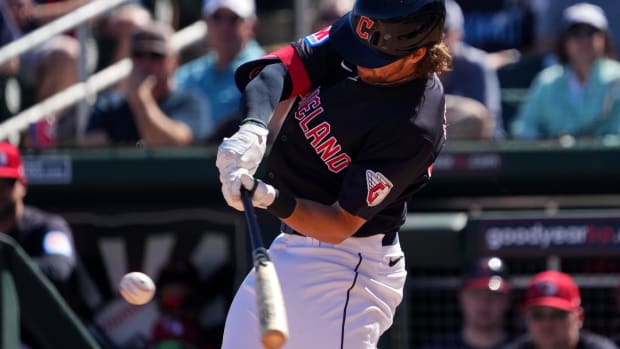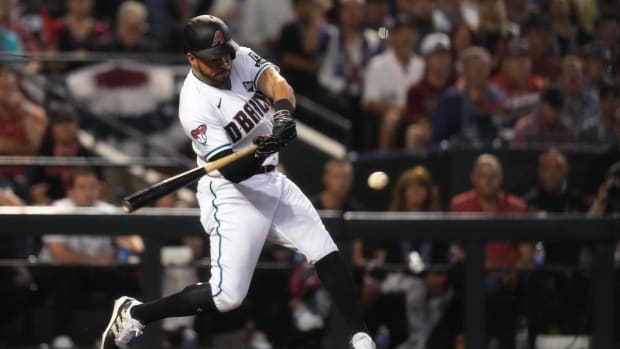Cardinals reward Matt Carpenter with a warranted, intelligent six-year extension
Matt Carpenter can get comfortable in red after signing a contract extension with the Redbirds. (Jeff Roberson/AP)
The St. Louis Cardinals have come to terms with third baseman Matt Carpenter on Thursday on a six-year extension worth $52 million. The deal buys out all three of Carpenter's arbitration years (2015 to 2017) as well as two of his free agent seasons and includes an $18.5 million option for 2020, Carpenter's age-34 season.
Drafted out of Texas Christian University in the 13th round of the 2009 amateur draft, Carpenter didn't make his professional debut until the age of 23, but has done nothing but hit since. In his two full minor league seasons, 2010 and 2011, he hit a combined .305/.418/.467 in 1,135 plate appearances, all but 128 of which came in Double- or Triple-A. Since graduating to the majors permanently in 2012, he has hit .310/.383/.475 in another 1,057 plate appearances. A natural third baseman, he filled in at second base for the Cardinals last year and turned in an MVP-quality season, leading the majors in hits (199), runs (126), and doubles (55), putting up a .318/.392/.481 line, playing solid defense, making the All-Star team, winning the Silver Slugger, and finishing fourth in the MVP voting.
Carpenter is likely to regress some coming off that performance, which came in his age-27 season, but his track record suggests that any regression Carpenter might experience at the plate won't be significant. He's a good bet to maintain a .290 or better average, a high-on base percentage, and valuable doubles power going forward, and should supply solid, though not spectacular, defense at third base, where he will return due to the readiness of second base prospect Kolten Wong and the Cardinals' decision to trade 2011 World Series hero David Freese coming off a miserable age-30 season. Indeed, Carpenter could benefit from the return to his natural position, where he also started 24 games last year, as he was effectively learning second base on the job in 2013, having played just 18 innings there as a professional prior to last year.
Given that, this looks like a good investment for the Cardinals. Carpenter wasn't going to be arbitration eligible until after the coming season, but given his MVP-quality performance in 2013, a merely representative showing in the coming season likely would have netted him more than $5 million for the 2015 season (for comparison's sake, consider the $6.5 million Giancarlo Stanton landed as a first-year arb-eligible player in January or Mark Trumbo's $4.8 million settlement with the Diamondbacks, which also came in his first year of arbitration eligibility). If we consider that Carpenter was likely to make roughly $15 million in his first two years of arbitration, and thus approximately $15.5 million over the next three seasons (the payout of his new contract will actually pay him $12.25 million over that same span), what the Cardinals have really done here is lock in Carpenter's final arbitration year and his first two free agent years for an average annual value of roughly $12.2 million, which seems like a very reasonable price.
It is not, however, a tremendous bargain, and that option for 2020, which would represent a $4 million raise over Carpenter's guaranteed 2019 salary, looks from this vantage point like one that St. Louis is unlikely to exercise. The basic terms of Carpenter's extension are roughly the same that as the extension the Mets gave to David Wright toward the end of the 2006 season at the same stage of his career (Wright's contract guaranteed him $55 million over 6 years with a $16 million club option for the seventh year). Wright was then heading into his age-24 season and projected as a superstar. Of course, player salaries have escalated over the last seven years, particularly this offseason with the game flush with new national television money.
Perhaps a more apt recent comparison might be the contract the Cardinals gave to fellow late-bloomer Allen Craig a year ago. Craig was, at that point, also heading into his age-28 season and had a similar track record as player drafted out of college, in his case in the eighth round, who had displayed positional flexibility and a consistently productive batting stroke throughout his professional career. Craig had hit .309/.357/.532 in the two seasons prior to signing his extension, but settled for a much more team-friendly $31 million over five years. The caveat there is that Craig had also displayed a fragility not yet seen in Carpenter, who played in 157 games last year and has hit the disabled list just once as a professional, that for an oblique strain in 2012.
Matt Holliday
Jhonny Peralta
Jaime Garcia
Oscar Taveras




































